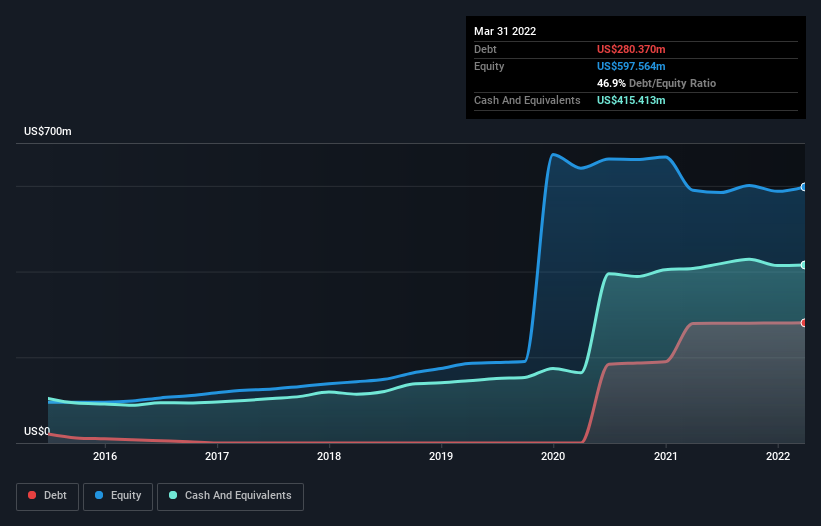
Warren Buffett famously said, 'Volatility is far from synonymous with risk.' It's only natural to consider a company's balance sheet when you examine how risky it is, since debt is often involved when a business collapses. As with many other companies Glaukos Corporation (NYSE:GKOS) makes use of debt. But should shareholders be worried about its use of debt?
Why Does Debt Bring Risk?
Generally speaking, debt only becomes a real problem when a company can't easily pay it off, either by raising capital or with its own cash flow. If things get really bad, the lenders can take control of the business. However, a more usual (but still expensive) situation is where a company must dilute shareholders at a cheap share price simply to get debt under control. By replacing dilution, though, debt can be an extremely good tool for businesses that need capital to invest in growth at high rates of return. The first thing to do when considering how much debt a business uses is to look at its cash and debt together.
View our latest analysis for Glaukos
What Is Glaukos's Net Debt?
As you can see below, Glaukos had US$280.4m of debt, at March 2022, which is about the same as the year before. You can click the chart for greater detail. But it also has US$415.4m in cash to offset that, meaning it has US$135.0m net cash.

How Strong Is Glaukos' Balance Sheet?
According to the last reported balance sheet, Glaukos had liabilities of US$55.6m due within 12 months, and liabilities of US$398.9m due beyond 12 months. On the other hand, it had cash of US$415.4m and US$34.8m worth of receivables due within a year. So its total liabilities are just about perfectly matched by its shorter-term, liquid assets.
Having regard to Glaukos' size, it seems that its liquid assets are well balanced with its total liabilities. So while it's hard to imagine that the US$2.25b company is struggling for cash, we still think it's worth monitoring its balance sheet. While it does have liabilities worth noting, Glaukos also has more cash than debt, so we're pretty confident it can manage its debt safely. The balance sheet is clearly the area to focus on when you are analysing debt. But ultimately the future profitability of the business will decide if Glaukos can strengthen its balance sheet over time. So if you're focused on the future you can check out this free report showing analyst profit forecasts.
Over 12 months, Glaukos reported revenue of US$294m, which is a gain of 24%, although it did not report any earnings before interest and tax. Shareholders probably have their fingers crossed that it can grow its way to profits.
So How Risky Is Glaukos?
Statistically speaking companies that lose money are riskier than those that make money. And the fact is that over the last twelve months Glaukos lost money at the earnings before interest and tax (EBIT) line. And over the same period it saw negative free cash outflow of US$6.9m and booked a US$28m accounting loss. But the saving grace is the US$135.0m on the balance sheet. That means it could keep spending at its current rate for more than two years. With very solid revenue growth in the last year, Glaukos may be on a path to profitability. Pre-profit companies are often risky, but they can also offer great rewards. There's no doubt that we learn most about debt from the balance sheet. But ultimately, every company can contain risks that exist outside of the balance sheet. Case in point: We've spotted 3 warning signs for Glaukos you should be aware of.
Of course, if you're the type of investor who prefers buying stocks without the burden of debt, then don't hesitate to discover our exclusive list of net cash growth stocks, today.
New: Manage All Your Stock Portfolios in One Place
We've created the ultimate portfolio companion for stock investors, and it's free.
• Connect an unlimited number of Portfolios and see your total in one currency
• Be alerted to new Warning Signs or Risks via email or mobile
• Track the Fair Value of your stocks
Have feedback on this article? Concerned about the content? Get in touch with us directly. Alternatively, email editorial-team (at) simplywallst.com.
This article by Simply Wall St is general in nature. We provide commentary based on historical data and analyst forecasts only using an unbiased methodology and our articles are not intended to be financial advice. It does not constitute a recommendation to buy or sell any stock, and does not take account of your objectives, or your financial situation. We aim to bring you long-term focused analysis driven by fundamental data. Note that our analysis may not factor in the latest price-sensitive company announcements or qualitative material. Simply Wall St has no position in any stocks mentioned.
About NYSE:GKOS
Glaukos
An ophthalmic pharmaceutical and medical technology company, focuses on the development of novel therapies for the treatment of glaucoma, corneal disorders, and retinal diseases.
Adequate balance sheet and slightly overvalued.

